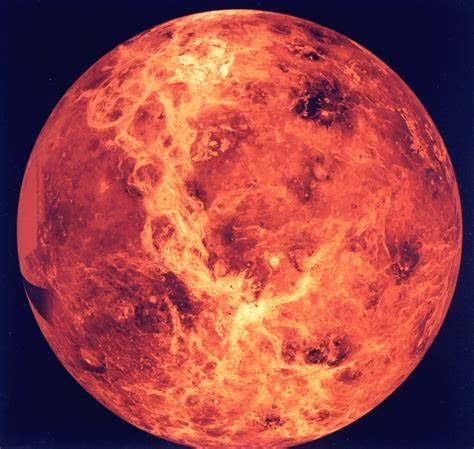Presence of Phosphine on Venus
2020 SEP 21
Preliminary >
Science and Technology > Miscellaneous > Cosmology

Why in news?
- Scientists have announced the discovery of traces of a molecule known as phosphine on Venus.
Why is this discovery important?
- Given the chemical and geological composition of Venus, the presence of Phosphine can imply the existence of life forms that release this substance through bio-chemical pathways.
- After estimating the amount of Phosphine in Venus’s atmosphere researchers have calculated that natural chemical processes, such as sunlight, volcanoes erupting and lightning at most produce only a fraction of phosphine they have detected.
- However, they do not rule out the possibility that there could be unknown natural processes (photochemistry or geochemistry) that can produce this amount of the biomarker.
- Therefore, more work is needed to prove that it is indeed because of bacteria, or some sort of life, that there is so much phosphine on Venus.
Why is phosphine gas considered a biomarker of life?
- A molecule of phosphine gas consists of a phosphorus atom surrounded by three hydrogen atoms.
- On Earth, this molecule is produced by industrial processes.
- It is also produced by some anaerobic bacteria, which live in oxygen-sparse environments such as sewers, landfills, or even animal guts.
- If you can rule out the production of the gas through chemistry, it is the biochemical processes that form a source of the gas — the anaerobic bacteria — hence it is considered a biomarker in astronomy.
Has phosphine been found on other planets?
- Yes, it has been seen on Jupiter and Saturn.
- But there it is said to form deep in the interiors of the gas giant and rise to the top, in a purely chemical process. But now, on Venus there is a doubt.
Can life survive in Venus?
- The surface temperature of Venus, at about 470 degrees Celsius, is too hot to harbour life as we know it.
- It is hotter than Mercury which is closest to the sun.
- But high up in its atmosphere, there are clouds which can provide a cooler home for microbial life. Even there, the atmosphere is teeming with sulphuric acid vapour which makes it extremely hostile, thereby reducing the chance of finding life forms.
- According to the experst, the phosphine signature could be the sign of some extraordinary chemistry, as it could be of life forms.
- The next logical step is to actually do in situ measurements from Venus’s atmosphere by sending space probes there.
Space missions sent to Venus:
- There have been several space missions to study Venus, and some of the recent dedicated missions are
- European Space Agency’s Venus Express
- JAXA (Japan Aerospace Exploration Agency)’s Akatsuki.
- Many space missions have flown by Venus:
- NASA’s Parker Solar Probe
- The Indian Venus mission is being developed. Though formally unnamed, it is referred to as Shukrayaan-1.
About Venus:
- Venus is the second planet from the Sun.
- Venus does not have any moons, a distinction it shares only with Mercury among planets in the Solar System.
- Venus is a terrestrial planet and is sometimes called Earth's "sister planet" because of their similar size, mass, proximity to the Sun, and bulk composition.
- It has the densest atmosphere of the four terrestrial planets, consisting of more than 96% carbon dioxide.
- The atmospheric pressure at the planet's surface is about 92 times the sea level pressure of Earth and has the hottest surface of any planet in the Solar System, with a mean temperature of 464 °C, even though Mercury is closer to the Sun.
PRELIMS QUESTION
Consider the following statements regarding Phosphine, a chemical recently in news:
1.It is a compound molecule consisting of Phosphorus and Carbon only.
2.It is considered as a biomarker, or an indicator of presence of life in astronomy.
Which of the statements given above is/are correct?
(a)1 only
(b)2 only
(c)Both 1 and 2
(d)Neither 1 nor 2
Answer to prelims question
